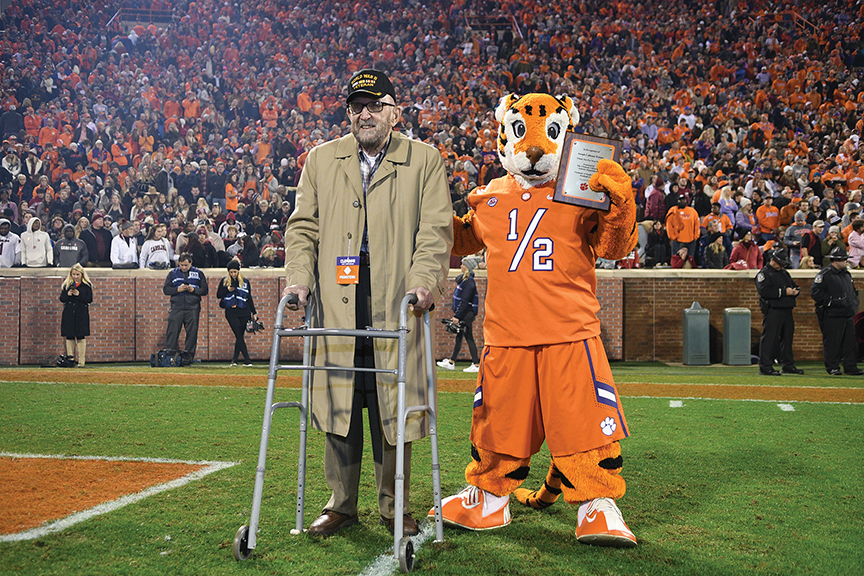
Joe Watson was surprised when he received a call from his alma mater that he was going to be the veteran recognized during half time at the Clemson-Carolina game on November 24, 2018. (He had been nominated by his brother’s great niece, who is a freshman this year, to receive this honor.)
Joe was in the class of 1944 but at the end of his Sophomore year, Uncle Sam had other plans for him. He went to advanced ROTC training and during the remainder of his junior year, there was an opening in the tank destroyers. He and his friends heard that in North Africa the casualty rate in tank destroyers was very high, so they saw this as an opportunity to quick advancement! The Army needed infantry soldiers, so they sent him to Ft. McLellan in Alabama where he took his training, and then on to Officer Candidate School at Ft. Benning, where he graduated as a 2nd Lieutenant. He was assigned to the 75th Infantry Division at Camp Breckinridge, Kentucky and then went on to ASTP for a year of schooling for leaders. Joe said they received the nickname “Diaper Division” because they were all so young! There he was assigned to Company D, 291st Regiment of the 75th Infantry as a platoon leader for an 81mm Mortar Platoon.
Early in the fall of 1944, he went to Pembroke, Wales and crossed the Channel to head to Belgium in 40 X 8 boxcars. On his first night in the cold, he was told to change his socks every night. He put them outside of his flimsy sleeping bag, and as you might expect, the socks froze solid. Because he was fortunate enough to have a jeep, he thawed them out on the jeep manifold and did not make that mistake again! Just as a side note, Joe said his jeep driver had been a student at Princeton.
Then the Battle of the Bulge began. Joe said his company commander called him to a high hill. He could see a house below where the commander had sent some men, and the Germans inside the house shot the men, as well as the medics sent to provide aid. Joe was to reestablish firepower from the forward observers and the mortar units as the Germans had cut the communications wiring. Joe said his company commander was “spitting mad,” but his platoon was able to string more wire and reconnect communications. Of course, the mortar fire caused the Germans to retaliate with artillery fire, so all of Joe’s men dove into pre-existing foxholes (it had previously been occupied by the Germans). Joe looked out and saw his runner did not have a foxhole to dive into, so he got out of his to give it to the runner.
As the war progressed, Joe’s platoon’s job during advancing was to leapfrog the mortar positions to be sure one was able to fire at all times. He saw men come out of the woods with their overcoats draped around them completely frozen.
It was in January 1945 when Joe was hit with artillery fire in his thigh. He was taken to an aid station where they cut out the bullet and he was given the new drug of penicillin as he was transported to Paris to the hospital. In Paris, they sewed up his thigh and sent him to another hospital in France to recover. At that hospital, he was moved around on a stretcher carried by German prisoners in German uniforms. Upon recovery, he returned to his unit in Holland. When the war ended, he went to Camp New York in France and then processed out at Camp Phillip Morris in Le Havre, France.
Joe went home to the States in June 1945, returned to his beloved Clemson College in September 1945, and graduated in February 1947. When asked about the recognition bestowed on him at the largest football rivalry game in South Carolina each year, he said, “I felt a little guilty really. There had been other people that had done more than me, but I gratefully appreciated it.” As a person who held season tickets for a long, long time, he was “flabbergasted” that he was recognized at such an important game.
Joe went on to say that he was very fortunate—as a platoon commander, he had a jeep and was not always in a foxhole as so many men were. He appreciated the privilege of doing his job for liberty, and the loyalty and efficiency of the men in his platoon. He wants to be remembered as a Lieutenant who got out of his foxhole to give it to one of his men during enemy fire.
The South Carolina Chapter is very proud of Joe and thankful that he received this recognition in such a prestigious way.
—Submitted by Barbara Mooneyhan, Executive VP of BOBA